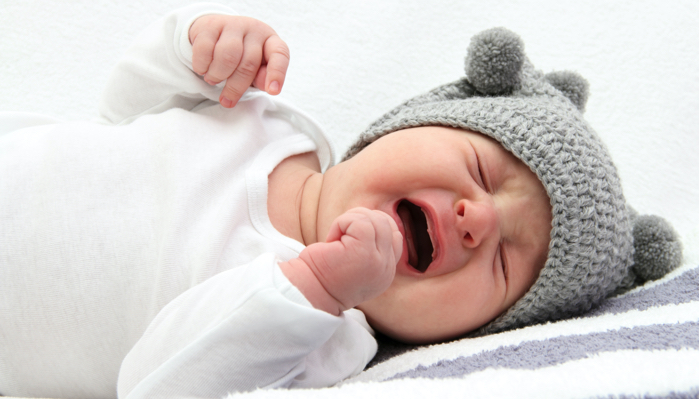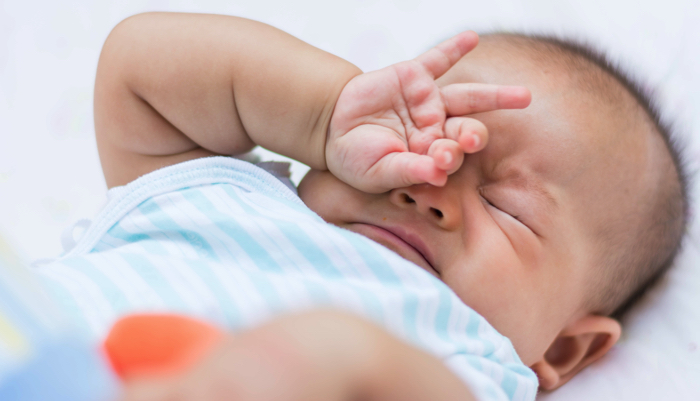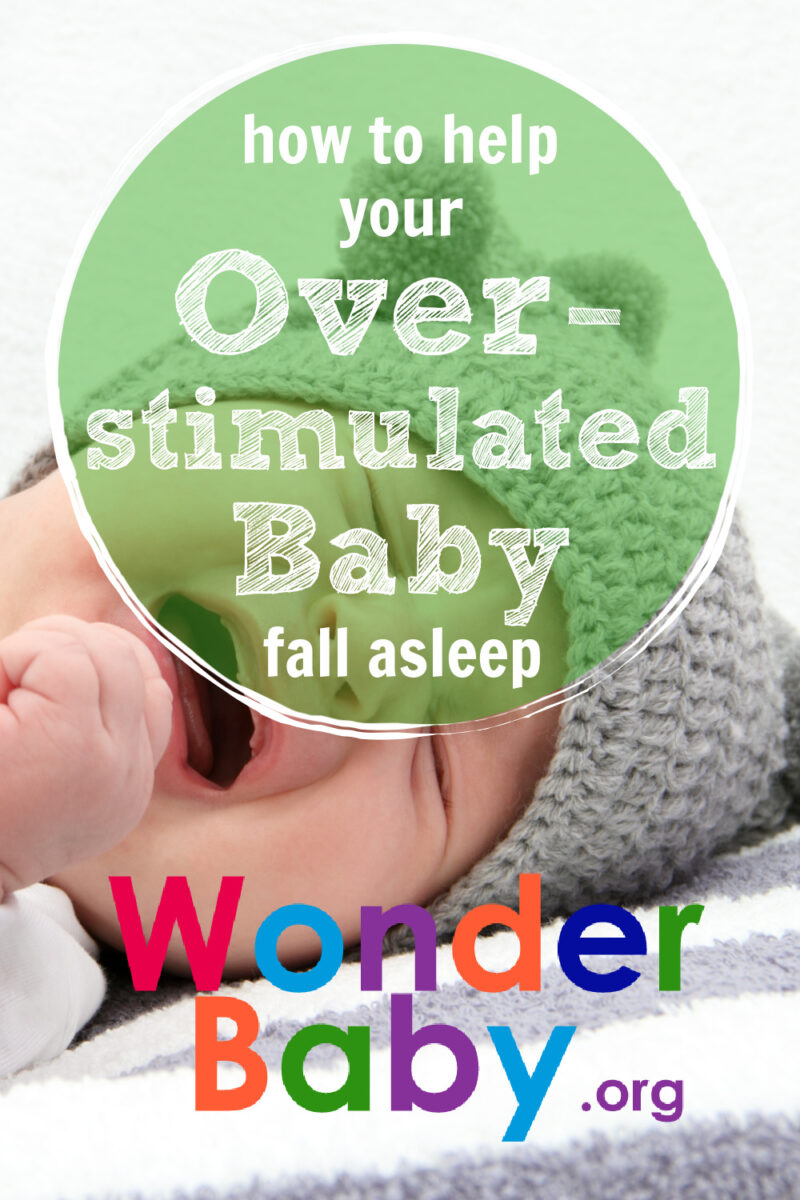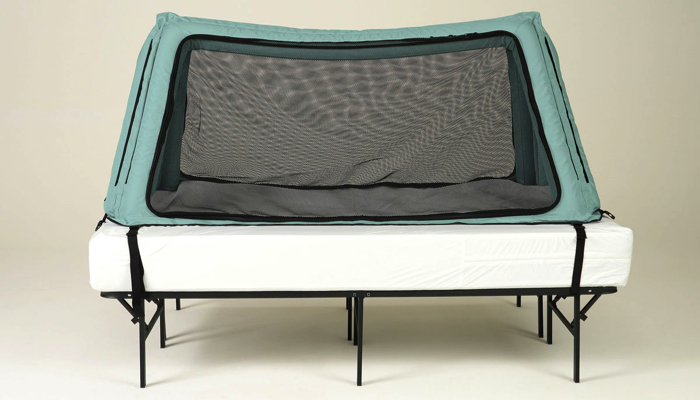How to Help Your Overstimulated Baby Fall Asleep

- Your baby’s brain has a unique way of processing sensory information. It’s this uniqueness that determines their attention span, self-regulation, and coping abilities.
- Even without the ability to talk yet, your baby has ways of expressing that he’s overstimulated.
- Finding the overstimulating culprit might involve playing the guessing game. The winning strategy: learn your baby’s cues.
- Planning an “escape route” is key. Pay close attention to your environment. Is it loud? Are there flashing lights or large crowds? Look for opportunities to step away or leave. (By the way, an overstimulated baby is a great excuse to duck out of a not-so-fun party.)
Your baby won’t sleep, and you’re scanning your mental list for the cause. Is overstimulation on that list?
Comfortable, warm, and safe, the womb was the epitome of low-stress living. Now it’s countless encounters upon endless stimuli. No wonder babies (and adults) become overstimulated and can’t sleep!
Fortunately, you can find what’s overstimulating your little one and help him fall asleep.
How Do Babies Get Overstimulated?
Most newborns have a strong reflex response, called the Moro reflex. The survival instinct causes your child’s body to produce cortisol, or the “fight or flight” hormone. As cortisol rushes through the body, your baby’s blood pressure rises.
Your baby’s central nervous system and brain’s ability to process sensory information are still developing. If your baby perceives the amount and intensity of stimulation as “too much,” his sensory system will overload.
There are several common causes for overstimulation:
- Unfamiliar people interacting with your baby
- An environment with loud noises, bright lights, and fast movements
- New activities or toys – Stick to calming activities, such as lying down together or reading a book. Providing a textured blanket for your baby to feel and smell can provide plenty of healthy stimulation without overwhelming him.
- A strange odor – It can be someone’s perfume or the exhaust of a car. Smells can be subtle, but be mindful of those that can be invading your baby’s nose.
- Hunger – Has your baby missed a feeding?
- A missed nap – Your baby may be overtired, which ironically makes him more prone to overstimulation.
- A temperature or climate that your baby might find too hot or too cold
- An interruption to his routine – Babies thrive on the familiar. When thrown off the predictability of his routine, your baby can become overstimulated.
- An illness or a medical condition – It could be a cold or perhaps a health issue. With their heightened sensory systems, children with autism are especially sensitive and prone to overstimulation. Illnesses affecting the senses also cause overstimulation.
- Screen time – Any device with a screen may be too much for your baby’s developing brain to handle.
You may have noticed that there’s a possible cause for your baby’s overstimulation just about anywhere, including your home. Causes of overstimulation, however, differ for all babies. An object or a sound that one baby finds soothing might overstimulate another.

How Do You Know if Your Baby is Overstimulated?
Babies exhibit signs of overstimulation, and you can learn your baby’s unique way of informing you that something is overwhelming their senses. In reaction to overstimulation, your baby’s behavior and expressions change.
- Becoming tense or freezing up
- Becoming limp
- Fussiness
- Frantic movements
- Waving arms and kicking legs in a rigid manner
- Louder-than-usual cries
- High-pitched cries
- Turning away from you
- Eye-rubbing
- Covering eyes and face
- Grimacing or frowning
- Glazed-over expression or eyes
- Excessive hiccuping or yawning
- Change in complexion (skin becomes red or splotchy)
How Do You Prevent an Overstimulated Baby?
Babies are minimalists, especially newborns. You are enough to fascinate, entertain, and educate your baby.
By being present and engaged, you are taking steps to prevent an overstimulated baby:
- Gaze at your baby. When your little one holds your gaze, he is learning the first stage of communication. Your eye contact and smile provide plenty of stimulation.
- Wear your baby. Your baby can survey his surroundings in the comfort and closeness of your body. When carrying your child facing outward, be sure that you’re able to check his expressions and reactions often.
- Create a calm environment. Starting with the baby’s room, choose a neutral or pale color palette. Use soft lighting. Monitor the room temperature, making sure there are no drafts.
- Make a sleep plan, and stick to it. Babies will commonly experience sleep regression, and overstimulation doesn’t help. Find a sleep training method that works for you.
- Avoid busy environments with loud noises, bright lights, including fast-moving objects and people. Fast movements can confuse your baby’s senses.
- Take plenty of breaks. Keep activities nice and short, and take a break before the next activity. An introduction to friends and family is also a momentous event for your baby. In between all the cooing, squeals, and peek-a-boos, let your little one take a breather in a quiet room.
- Talk to your baby. Especially in new situations and environments, your voice (when calm and happy) provides reassurance for your baby.
- Limit screentime. If a loud, flashy toy can overstimulate babies, imagine the impact of screens. According to the American Academy of Pediatrics, babies under 2 years old are especially prone to become overstimulated from TVs, phones, and other devices.

How Do You Calm an Overstimulated Baby?
There are ways to calm your overstimulated baby:
- Act in a gentle manner. You don’t want to add to your child’s overstimulation by making sudden movements or speaking with a loud voice. Use a calm and quiet voice, which can help reassure him. When your baby is overstimulated, avoid rocking or bouncing him.
- Try to keep a calm facial expression. Your baby is in tune with your emotions, and he can pick up on your anxiety or anger. Allow him to follow your lead by remaining calm.
- Promptly yet gently remove your baby from the stimuli. Find a quiet, dimly lit room.
- Hold or wear your baby. Your closeness will bring him comfort. If touch seems to be the cause of overstimulation, lay your baby down in a safe and quiet space. Stay close to your baby without touching him. When babies are overstimulated, some of them tend to resist being held or touched.
- Take a nature walk. Exposure to nature increases children’s ability to focus, regulate emotions, and solve problems. Nature has a wondrous way of stimulating the senses while calming the body all at once.
- Respond with empathy, and provide your baby with a supportive environment. According to the American Academy of Pediatrics, a supportive environment includes recognizing your baby’s cues and reducing the stimulus that he may be hearing, seeing, or touching.
How Can You Help Your Overstimulated Baby Fall Asleep?
Interruptions in your baby’s routines and sleep schedule throw off his circadian rhythm and melatonin production. This makes for an overtired and overstimulated baby struggling to physically control his “wind-down” process for sleep.
You can help your overstimulated baby fall asleep with these steps:
- Help your baby bring his hand to his mouth. The sucking action on his hand will lower his stress levels and blood pressure and slow down his heart rate. Your little one will recall this calming reflex and his calm days in the womb.
- While holding your child, tuck in his arms and legs close to his body. You can swaddle your baby if they are under 2 months old and unable to roll yet. When done correctly, swaddling applies balanced pressure and replicates the environment of the womb. Some babies enjoy being swaddled while others don’t.
- Take your baby to a dark room, ideally with blackout curtains.
- Switch on the white noise machine. Pediatricians recommend placing the machine at least 7 feet away from your baby’s sleeping space to prevent hearing problems.
- Gently massage and stroke your baby. Your pleasant touch can help soothe him.
When Should You See a Doctor for Overstimulation?
One in 6 children struggle with sensory processing. Pre-term babies or babies with Down syndrome, for example, are prone to experiencing frequent overstimulation. There are behaviors to look out for and discuss with the doctor if your baby:
- has difficulty moving
- frequently resists touch, such as hugs
- is hyperactive
- is over responsive or under responsive
FAQs
Is Overstimulation Bad for Babies?
Every baby is bound to become overstimulated. When overstimulation occurs occasionally, babies will not experience negative long-term effects.
Constant overstimulation, however, can cause babies to find the world as a dangerous place. To protect themselves, their bodies shut down. Such intense and consistent pressure on their senses may eventually harm their emotional, physical, and cognitive development. They may become a clingy toddler as they get older.
It’s challenging to keep your baby from becoming overstimulated. The world is too unpredictable, and sometimes you can miss their signs of overstimulation. The key is to remain mindful of avoiding prolonged overexposure.
What Are Signs of Stress or Distress in Babies?
- Frantic movements
- Throwing out arms and legs stiffly
- Spread fingers and toes
- Disengaging and turning away from you
- Arching the back
- Squirming
- Change in complexion
Does TV Overstimulate Babies?
Yes. The rapid pace, constant flashes, changes in noises, and vivid colors can overstimulate babies. The American Academy of Pediatrics recommends that children under 2 years old should not watch TV. According to medically reviewed studies that observed exposure to TV in the first 3 years, children with excessive exposure have experienced attention deficits later in life.

Related Posts

Sleep, Special Needs
Safe Place Bedding Travel Bed Review
Traveling with a special needs child can be stressful! Having a safe, durable, and easy to use travel bed can make traveling so much easier!

Sleep, Special Needs
Sleep Regimen for Premature Babies: Special Considerations
It can take premature babies much longer than their full-term peers to sleep for long stretches. A preemie sleep schedule may encourage better sleep.

Sleep
Mastering the Bedtime Routine: 3 Tips for a Peaceful Night’s Sleep
From around six weeks, a newborn bedtime routine can help your baby learn the difference between day and night and prepare for a restful night’s sleep.